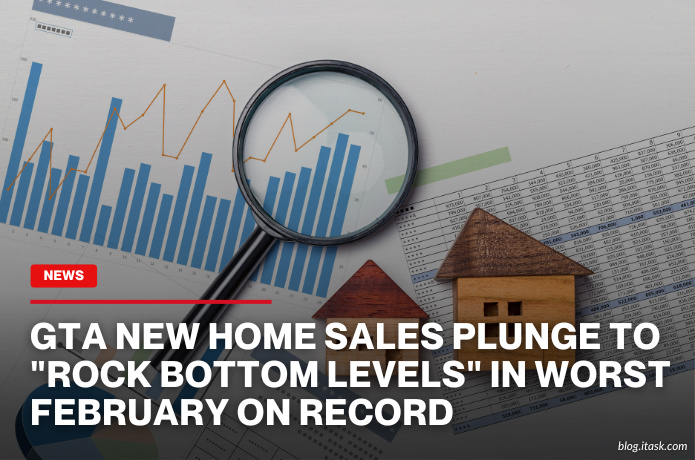GTA New Home Sales Plunge To "Rock Bottom Levels" In Worst February On Record
GTA New Home Sales Plunge To "Rock Bottom Levels" In Worst February On Record

New home sales in the Greater Toronto Area (GTA) have hit an all-time low for February, with only 400 transactions recorded last month. This marks a 50% drop compared to February 2024 and an 84% decline from the 10-year average of 2,570 sales for the month. Industry experts are expressing serious concerns about the future of the housing market in the region.
The Building Industry and Land Development Association (BILD) reports that this downturn is not an isolated incident. Throughout 2024, the GTA experienced multiple months of record-low new home sales, culminating in December with the lowest figures seen in 40 years. BILD's Senior Vice President, Justin Sherwood, warns that the industry is facing a "cost to build" crisis, risking a significant impact on housing supply and affordability.
Of the 400 new homes sold in February, 248 were single-family homes, representing a 38% decrease from the previous year and 75% below the 10-year average. Condominium sales were even more affected, with only 152 units sold—a 62% drop year-over-year and 90% below the decade average. This significant decline in sales is contributing to an oversupply in the market.
Several factors are contributing to this slump. High construction costs, elevated municipal fees, and prolonged approval processes are making it challenging for developers. Additionally, economic uncertainties, including trade tensions with the United States, are causing potential buyers to hesitate. Edward Jegg, Research Manager at Altus Group, notes that concerns over upcoming U.S. tariffs are further dampening buyer confidence.
In response, BILD is advocating for government action to stimulate the housing market. Proposals include reducing municipal fees, streamlining approval processes, and implementing tax incentives for new home buyers. Recent political pledges to eliminate the Goods and Services Tax (GST) on new homes up to certain price points are seen as positive steps, but industry leaders believe more comprehensive measures are necessary.
As the GTA faces these unprecedented challenges, stakeholders emphasize the need for coordinated efforts between government and industry to address the housing crisis. Without timely intervention, the region risks long-term consequences for housing availability and affordability.
